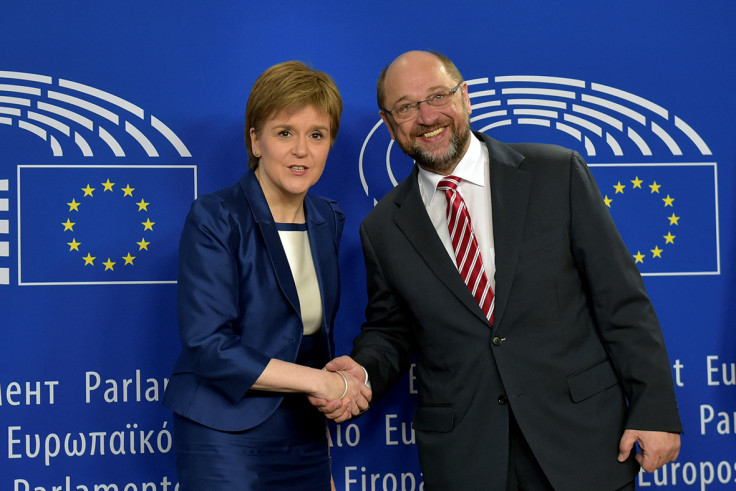Brexit reaction as it happened: Cameron tells Corbyn 'go now' as Labour leadership row rumbles on
Latest updates from post-Brexit Britain as Corbyn loses confidence vote and Cameron leaves Brussels.
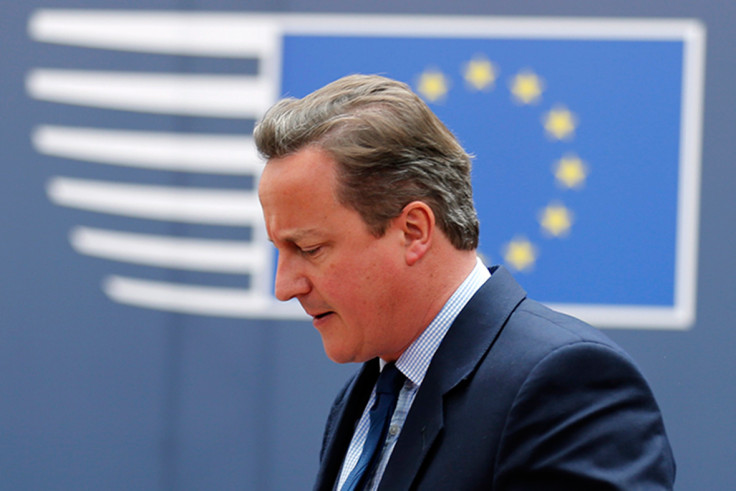
- 27 EU leaders meet without Britain for first time
- Jeremy Corbyn clings to leadership despite not having backing of 127 Labour MPs
- Stephen Crabb first to launch leadership bid as nominations open
- Former defence secretary Dr Liam Fox is to run for Tory Party leader
- Email from Sarah Vine, the wife of Michael Gove, leaked to Sky News
Another day, and what a day, and still Jeremy Corbyn remains leader of the Labour Party. On the Conservative side, Dr Liam Fox and Stephen Crabb make their intentions on seeking the party leadership clear. But still nothing from the two heavyweights likely to fight it out for the top job: Boris Johnson and Theresa May. It seems that we'll have to wait at least another day for either or both to make a move. As for Corbyn, who knows when it comes to the man who makes unpredictable sound like a plan?
Follow International Business Times UK for the latest on Brexit and everything else you need to know as it happens.
In news from beyond the Conservatives' leadership tussle and Labour's struggle over the same:
Following on from David Cameron, today was Scotland First Minister Nicola Sturgeon's turn to address European Union leaders in Brussels. She says she made it clear Scotland wants to remain in the EU despite the UK voting for Brexit.
"I found doors to be open here today," she said. "If there is a way for Scotland to stay, I am determined to try to find that way."
Her predecessor Alex Salmond received a very different reception in 2014 when he sought assurances from the EU on Scotland's place in the union, prompting him to call today's talks "a very significant shift".
Meanwhile, numerous reports have claimed that Dr Liam Fox, the former defence secretary, is to run in the Conservative leadership race. He resigned in 2011 after allegations emerged that he had given a lobbyist friend, Adam Werritty, access to the Ministry of Defence. More recently he successfully campaigned for a Leave vote in the EU referendum.
An email from Sarah Vine, the journalist wife of Michael Gove, has been leaked to Sky News. The document apparently shows Sarah urging Michael to get a specific cabinet job offer commitment from Boris Johnson before backing the former Mayor of London's leadership bid. More here.
Betting company Paddy Power have made Boris Johnson the clear favourite to win the Conservative leadership with odds of 10/11 after "heavy backing throughout the day".
Elsewhere Home Secretary Theresa May is second in the betting at 7/4, with Stephen Crabb priced at 7/1 and Andrea Leadsom at 10/1.
Stephanie Anderson, Politics Trader at Paddy Power said: "Boris was as big as 6/4 this morning but we've had no choice but to cut the odds to 10/11 after heavy backing from punters. After record breaking industry turnover in the EU Ref vote that interest hasn't dwindled with plenty of bets in the next PM market – we expect that to continue to rise once Boris Johnson and Theresa May's formal campaigns start."
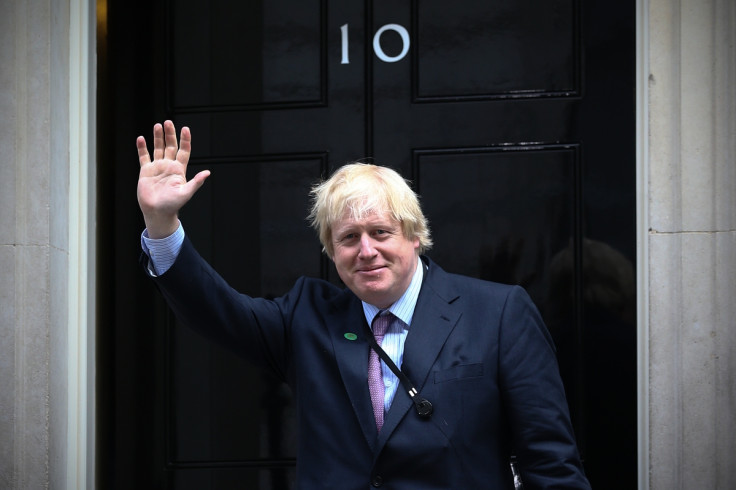
Also on IBTimes UK, we have an article about the organisers of a pro-Corbyn rally saying they've had to cancel event tonight as it became too popular.
It adds:
Organisers behind an emergency rally to drum-up support for Jeremy Corbyn have been forced to cancel the event due to "overwhelming" demand. A spokeswoman for Momentum, the left-wing pressure group, told IBTimes UK that the original venue of Congress House, London, was too small to fit the activists.
"It was already 50% overcapacity within a couple of hours [of advertising the event] and we were a bit concerned of so many people being down there," the spokeswoman explained. The group is now looking to reschedule the rally at a larger venue and hold the event "potentially tomorrow [30 June], but possibly early next week"
The full article from our reporter Ian Silvera can be read here.
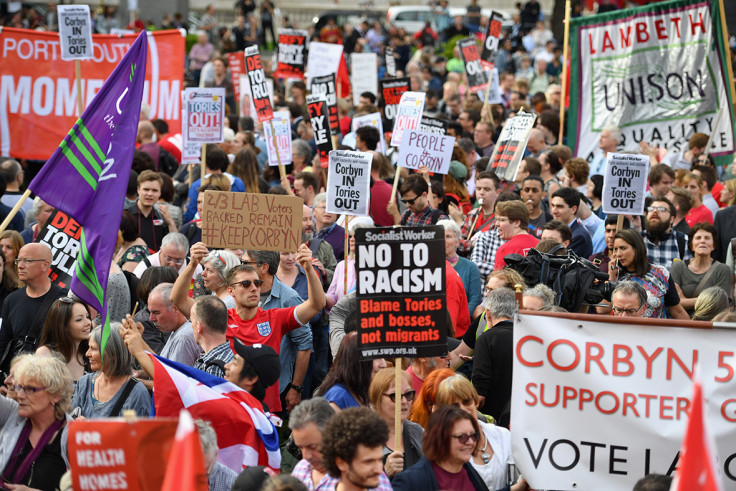
The Sun is reporting that a man who was never going to win the Tory leadership contest is going to pull out of the Tory leadership contest.
Exclusive: Liam Fox in talks about withdrawing from Tory leadership race to back Theresa May https://t.co/U4TaqBPpgX pic.twitter.com/BYtRKRB14z
— Sun Politics (@SunPolitics) June 29, 2016
Spain's prime minister, Mariano Rajoy, said he will block any attempt by Scotland to remain in the EU following Britain's exit.
Rajoy told reporters following a summit of the remaining European leaders in Brussels: "I want to be very clear Scotland does not have the competence to negotiate with the European Union. Spain opposes any negotiation by anyone other than the government of United Kingdom.
"I am extremely against it, the treaties are extremely against it and I believe everyone is extremely against it. If the United Kingdom leaves... Scotland leaves."
The comments arrived as Nicola Sturgeon arrived in Brussels to hold negotiations to remain with the EU after the country voted overwhelmingly to remain.
10 Downing Street has issued the full text of Cameron's statement to the House of Commons regarding his meeting at the European Council in Brussels yesterday.
It reads:
With permission, Mr Speaker, I will make a statement on yesterday's European Council.
This was the first Council since Britain decided to leave the European Union.The decision was accepted and we began constructive discussions about how to ensure a strong relationship between Britain and the countries of the EU.
But before the discussion on Britain, there were a number of other items on the agenda. Let me touch on them briefly.
On migration, the Council noted the very significant reductions in illegal crossings from Turkey to Greece as a result of the agreement made with Turkey in March. But it expressed continued concern over the central Mediterranean route and a determination to do all we can to combat people smuggling via Libya.
Britain continues to play a leading role in Operation Sophia with HMS Enterprise. And I can tell the House today that Royal Fleet Auxiliary Mounts Bay will also be deployed to stop the flow of weapons to terrorists, particularly Daesh, in Libya.
On NATO, Secretary General Stoltenberg gave a presentation ahead of the Warsaw summit and the Council agreed the need for NATO and the EU to work together in a complementary way to strengthen our security.
On completing the single market, there were important commitments on the digital single market, including that EU residents will be able to travel with the digital content they have purchased or subscribed to at home.
And on the economic situation, the President of the European Central Bank (ECB) gave a presentation in the light of the outcome of our referendum.
Private sector forecasts discussed at the Council included estimates of a reduction in eurozone growth potentially between 0.3% and 0.5% over the next 3 years. One of the main explanations for this is the predicted slowdown in the UK economy, given our trade with the euro area.
President Draghi reassured the Council that the ECB has worked with the Bank of England for many months to prepare for uncertainty, and in the face of continued volatility our institutions will continue to monitor markets and act as necessary.
Mr Speaker, returning to the main discussions around Britain leaving the EU, the tone of the meeting was one of sadness and regret. But there was an agreement that the decision of the British people should be respected.
We had positive discussions about the relationship we want to see between Britain and our European partners, and the next steps on leaving the EU, including some of the issues that need to be worked through and the timing for triggering Article 50.
Let me say a word about each.
First, we were clear that while Britain is leaving the European Union, we are not turning our backs on Europe – and they are not turning their backs on us.
Many of my counterparts talked warmly about the history and values that our countries share and the huge contribution that Britain has made to peace and progress in Europe.
For example, the Estonian Prime Minister described how the Royal Navy helped to secure the independence of his country a century ago. The Czech Prime Minister paid tribute to Britain as home for Czechs fleeing persecution.
Many of the countries of Eastern and Central Europe expressed the debt they feel to Britain for standing by them when they were suffering under communism and for supporting them as they joined the European Union.
And President Hollande talked movingly about the visit that he and I will be making later this week to the battlefields of the Somme, where British and French soldiers fought and died together for the freedom of our continent, and the defence of the democracy and the values that we share.
So the Council was clear that as we take forward this agenda of Britain leaving the European Union, we should rightly want to have the closest possible relationship that we can in the future.
In my view this should include the strongest possible relationship in terms of trade, co-operation and of course security, something that only becomes more important in the light of the appalling terrorist attack in Turkey last night.
Mr Speaker, as I said on Monday, as we work to implement the will of the British people, we also have a fundamental responsibility to bring our country together. We will not tolerate hate crime or any kind of attacks against people in our country because of their ethnic origin. And I reassured European leaders who were concerned about what they had heard was happening in Britain. We are a proud multi-faith, multi-ethnic society – and we will stay that way.
Turning to the next steps on leaving the EU, first there was a lot of reassurance that until Britain leaves, we are a full member. That means we are entitled to all the benefits of membership and full participation until the point at which we leave.
Second, we discussed some of the issues which will need to be worked through. I explained that in Britain there was great concern about the movement of people and the challenges of controlling immigration, as well as concerns about the issue of sovereignty.
In turn, many of our European partners were clear that it is impossible to have all of the benefits of membership without some of the costs of membership. And that is something that the next Prime Minister and their Cabinet is going to have to work through very carefully.
Third, on the timing for Article 50, contrary to some expectations, there wasn't a great clamour for Britain to trigger this straight away. While there were 1 or 2 voices calling for this, the overwhelming view of my fellow-leaders was that we need to take some time to get this right.
Of course, everyone wants to see a clear blueprint appear in terms of what Britain thinks is right for its future relationship with the EU. And as I explained in my statement on Monday, we are starting this work straightaway with the new unit in Whitehall, which will be led by a new Permanent Secretary Oliver Robbins.
This unit will examine all the options and possibilities in a neutral way, setting out their costs and benefits so that the next Prime Minister and their Cabinet have all the information they need with which to determine exactly the right approach to take and the right outcome to negotiate.
But the decisions that follow from this – including the triggering of Article 50 – are rightly for the next Prime Minister and the Council clearly understood and respected that.
Mr Speaker, I don't think it's a secret that I have, at times, found discussions in Brussels frustrating. But despite that, I do believe we can be proud of what we have achieved.
Whether it is putting a greater focus on jobs and growth, cutting the EU budget in real terms for the first time and reducing the burden of red tape on business, or building common positions on issues of national security, such as sanctions to stop Iran getting a nuclear weapon, standing up to Russian aggression in Ukraine and galvanising other European countries to help with the lead that Britain was taking in dealing with Ebola in Sierra Leone.
In all these ways, and more, we have shown how much we have in common with our European partners, as neighbours and allies who share fundamental values, history and culture.
It is a poignant reminder that while we will be leaving the European Union we must continue to work together, for the security and prosperity of our people for generations to come.
And I commend this statement to the House.
Speaking of a possible second Scottish referendum, Survation have released an opinion poll taken after the result of the EU Ref.
Scottish independence poll:
— Britain Elects (@britainelects) June 29, 2016
Yes: 53%
No: 47%
(via Survation, online / 24 - 28 Jun)
An extract from Gordon Brown's EU speech in Edinburgh this afternoon via Left Food Forward which the former prime minister warned against "being seduced by what might look like easy options' and blindly embracing Scottish independence".
Brown said:
"The Scottish government have suggested that their objective is to retain Scotland's position in the European single market by leaving the United Kingdom.
"They have even suggested that under Article 50 Scotland could be designated the UK's successor state in the European Union.
"The danger is that we become trapped in a debate between the Conservatives who settle for Britain without Europe and the Nationalists who settle for Europe without Britain."
"But because there are lessons to be drawn from a traumatic week, I want to caution about a rush of judgment and being seduced by what may look like easy options. In the hope that Scotland should not make the same mistakes as Britain, we should make calm and considered judgements based on facts."

Jean-Claude Junker speaks after the summit:
"No Internal Market à la carte" @JunckerEU #EUCO #EU27 pic.twitter.com/Ps05QDoW1G
— European Commission (@EU_Commission) June 29, 2016
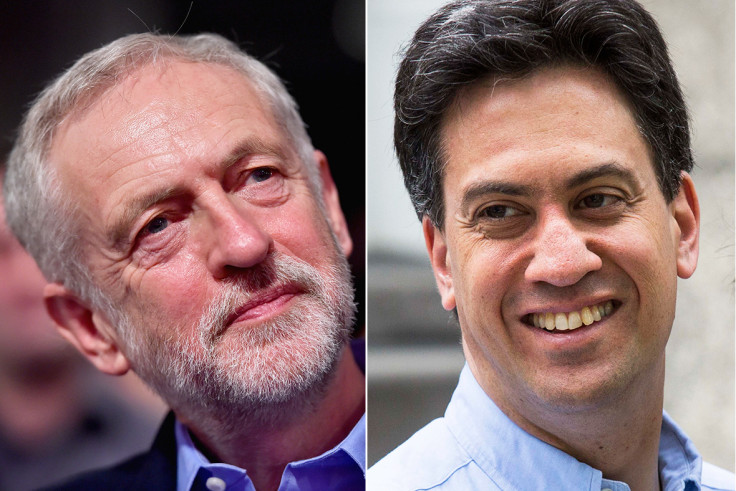
Former Labour Party leader Ed Miliband has joined those calling for Jeremy Corbyn's resignation.
Miliband told The Telegraph: ""I've supported Jeremy Corbyn all the way along because I think that was the right thing to do. I've reluctantly reached the conclusion that his position is untenable.
"The question is, what is the right thing for our party? I'm not a Blairite, I'm not a plotter. The best thing is that he stands down, as painful as that is for him and his supporters. Jeremy cannot rise to the challenge."
Corbyn supporters were pleased with PMQs today:
After days of hateful and personal attacks, Jeremy still able to hold Tories to account at #PMQs. We stand with him. pic.twitter.com/030mDnDFvA
— JeremyCorbyn4PM (@JeremyCorbyn4PM) June 29, 2016
Energy and Climate Change Secretary Amber Rudd said today that Britain's decision to leave the EU would make tackling climate change "a harder road". Rudd was speaking at the Business and Climate Change Summit in London, also saying that "climate change has not been downgraded as a threat".
Carswell tweets:
Never head an MP booed in Parliament before. I was today as I called for a new consensus. You judge https://t.co/tzxqPaKqDa
— Douglas Carswell MP (@DouglasCarswell) June 29, 2016
Cameron then asked to distance Nigel Farage from the "vast majority" of people who voted to Leave the EU following his speech in Brussels yesterday. Cameron said he has already condemned Farage during the referendum campaign.
Discussing his controversial 'Breaking Point' poster, Cameron adds: "We all know what he was trying to do."
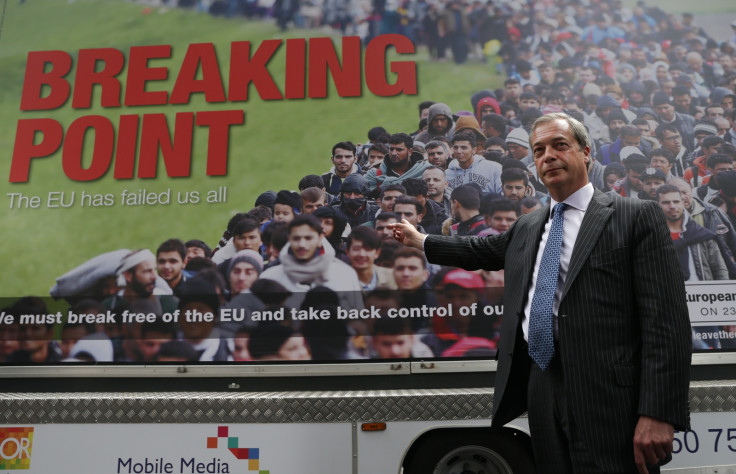
Boos and murmurs of "racists" and Ukip's sole MP and Leave campaigner Douglas Carswell stands up in the House of Commons.
Pantomime heckles for Douglas Carswell! Far more dramatic than any reception Corbyn got.
— Isabel Hardman (@IsabelHardman) June 29, 2016
Wow, sore Remainers booing and hissing as Douglas Carswell arises to ask.
— Harry Cole (@MrHarryCole) June 29, 2016
MPs are actually booing Douglas Carswell, presumably because of his Ukip affiliation. Asks for consensus, one MP shouts "NO!"
— Kate McCann (@KateEMcCann) June 29, 2016
Corbyn also asks about what government is going to do following rise in racist hate crimes in the UK since EU Referendum.
Cameron promises new measures including new steps in reporting hate crimes, fund for security measures and communities to tackle hate crimes. "Whatever we can do, we will do," he adds.
Corbyn also gets some mocking laughs from Tories when points out that Cameron only has two months left.
Corbyn stands up to echo concerns about Istanbul and pays respect to Patrick Mayhew, the former attorney general and Northern Ireland secretary following his death. mayhem played a huge role in the Good Friday agreement.
Continues to ask questions regarding the UK economy and markets in wake of the Brexit.
Cameron: We're in a strong position to meet these challenges because we have paid down so much of the deficit. Choppy waters will be ahead
— Ian Silvera (@ianjsilvera) June 29, 2016
This is so weird. Labour MPs staring at their hands, looking at phones and iPads, gazing into middle distance #pmqs
— Owen Bennett (@owenjbennett) June 29, 2016
No one on Labour benches is cheering any Corbyn question. But nor is Cameron gloating or Tories celebrating. Gentle parliamentary ping pong.
— Jim Waterson (@jimwaterson) June 29, 2016
Elsewhere, Pat Glass has quit her "dream job" in the shadow cabinet after just two days as the "situation is untenable".
It is with a heavy heart that I have today resigned as Shadow SoS Education. My dream job but the situation is untenable
— Pat Glass (@PatGlassMP) June 29, 2016
And almost immediately Emma Lewell-Buck says via Twitter she is also quitting from her role in the shadow cabinet after just a few days. Both resignations coming right before Cameron and Corbyn to meet at PMQs.
Today I'm stepping down as Shadow Minister heartbroken at state of Party & recent events so sorry things have came to this, statement later
— Emma Lewell-Buck (@EmmaLewellBuck) June 29, 2016
Not even sure how full Corbyn's side of the bench will be at this moment.
Asked about debate which has been all over social media past few days on whether he is prejudiced against gay people.
Crabb admits he voted against gay marriage but very happy with outcome of the result. Says it is no longer an issue in this leadership campaign.
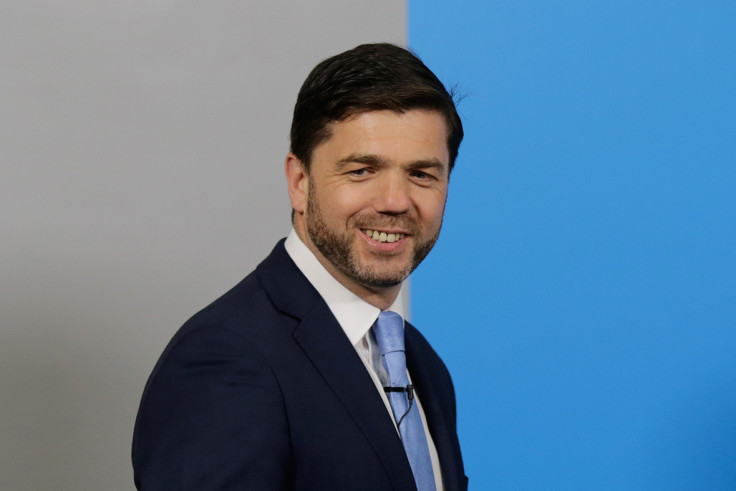
Crabb has already dismissed suggestions for a second referendum as "Brexit needs to do exactly it says on the tin".
Got huge cheer for rugby analogy while describing his upbringing, saying he learnt on the rainy rugby fields of Wales that "it's not a case of waiting for the ball to pop out of the back of a scrum, if you want it you do what's required".
Starting more than 30 minutes late, Crabb has now officially begun his speech to declare his intention to be a Tory leadership nomination.
He started by praising David Cameron as one of the county's greatest ever prime ministers who has "changed the Conservatives party and the country for the better".
Crabb repeats lines about his intentions to reunite a "divided nation" in the wake of the EU Referendum vote, also admitting no potential PM candidate has all the answers how to deal with the fall-out of a Brexit with such "mind boggingly complexity".
While Corbyn is facing pressure by his own MPs to resign, his popularity on social media appears to be growing, albeit according to Jeremy Corbyn for PM, the social media group run by former workers on the Labour leader's campaign last year
According to their press release, one graphic supporting him has been shared by 26,000 people and viewed by five million people within a few hours.
The release adds there has been:
- 227,000 signatures on a petition calling itself 'A vote of confidence in Jeremy Corbyn'
- 48,000 'likes' on Jeremy's Facebook status following the vote of no confidence
- 26,000 shares on one post encouraging confidence in Corbyn
Marshajane Thompson for JC4PM said: "The huge increase in activity on the accounts we run shows the breadth of support for Jeremy in Labour and in Britain. With messages of support flooding in, we've had enough engagement to win a leadership contest several times over. We know you can't win an election with social media power alone, but you can't win without it either, and our leader has it in spades."
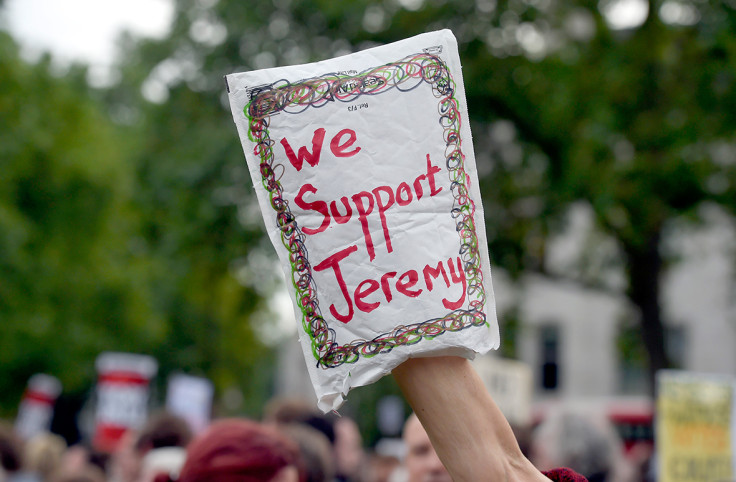
Photos coming through of Angela Eagle leaving her home in London as she is expected to announce a leadership challenge for the Labour party later.
However, as reported by New Statesmen political editor George Eaton, Tom Watson is keen to avoid such a challenge. Paul Waugh, Executive editor for Politics, at the Huffington Post, adds both Eagle and Watson want the other to step down as potential candidates.
He's reaching out to Corbyn's team to try to break the logjam. 2/2
— George Eaton (@georgeeaton) June 29, 2016
Labour coup important update: I'm told Watson and Eagle in an uneasy standoff, each wanting the other to back down.
— Paul Waugh (@paulwaugh) June 29, 2016

Waiting for Stephen Crabb leadership speech. He's got his slogan sorted pic.twitter.com/JBunm3SvrW
— Kylie MacLellan (@kyliemaclellan) June 29, 2016
In her column for the Daily Mail, Sarah Vine has written about what the morning of the EU Ref results were like with her husband Michael Gove.
It includes Gove's initial reaction and one inexplicable extract where it appears she seems to think running the country in this post-Brexit world is now partly her responsibility.
Vine writes:
I was perfectly prepared — and would have completely understood — if, in the privacy of the polling booth, the majority of the British people had preferred to err on the side of caution and vote for the status quo.
Instead, they showed incredible bravery. They ignored all the threats and lies, and voted according to their principles. Which, from where I'm standing, makes the result even more terrifying.
Because, given Michael's high-profile role in the Leave campaign, that means he — we — are now charged with implementing the instructions of 17 million people. And that is an awesome responsibility.
So as I lay there in my somewhat befuddled state that morning, triumphalism was the last thing on my mind. Or my husband's.
There was a short pause while he put on his glasses. 'Gosh,' he said. 'I suppose I had better get up.'
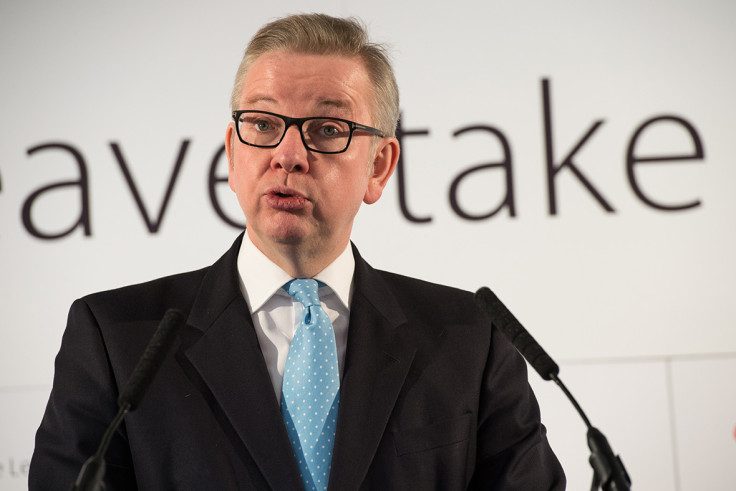
Thomas Piketty, the French economist known for his 2014 book Capital in the Twenty-First Century, has reportedly also left Labour as an adviser.
Yet more misery for Jeremy Corbyn: I learn Thomas Piketty, perhaps the world’s top left-wing thinker today, has quit as a Labour adviser
— Ed Conway (@EdConwaySky) June 29, 2016
Piketty told me: “I am deeply concerned with the Brexit vote, and with the very weak campaign of Labourâ€.
— Ed Conway (@EdConwaySky) June 29, 2016
Business Secretary Sajid Javid says he hopes to be Chancellor if running mate Stephen Crabb wins the Conservative leadership race.
Speaking to BBC radio 4's Today programme, Javid said Crabb "has what it takes to lead this country and unite it". He added: "It's all about implementation now and who are the best people, the best team, to get this done.
"In some ways, we're all Brexiteers now."
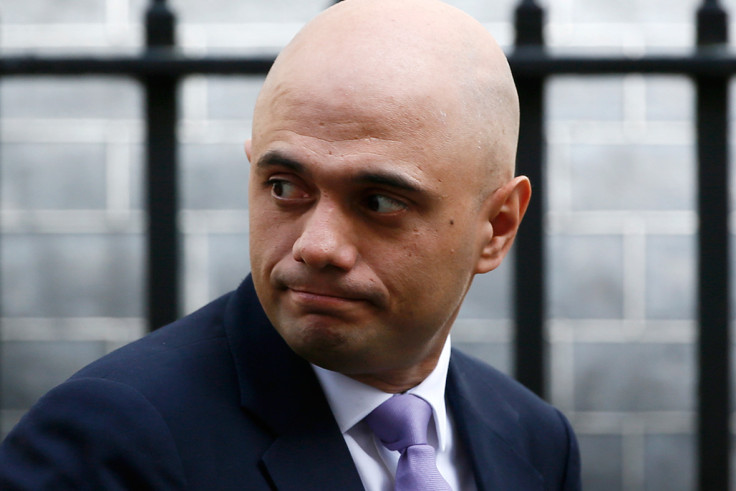
Stephen Crabb, who has declared he will put his hat in the ring for the Tory leadership vote, has outlined his intentions in an article for the Daily Telegraph.
The work and pensions secretary said he will lead a government that will delivers on the "expectations of the 17 million people who voted for Britain to leave the EU".
Crabb adds:
We cannot allow this leadership election to be defined by divisive labels like "Remainer" and "Brexiteer". The quicker we can focus on the future, the better chance we have to unite our party and the country.
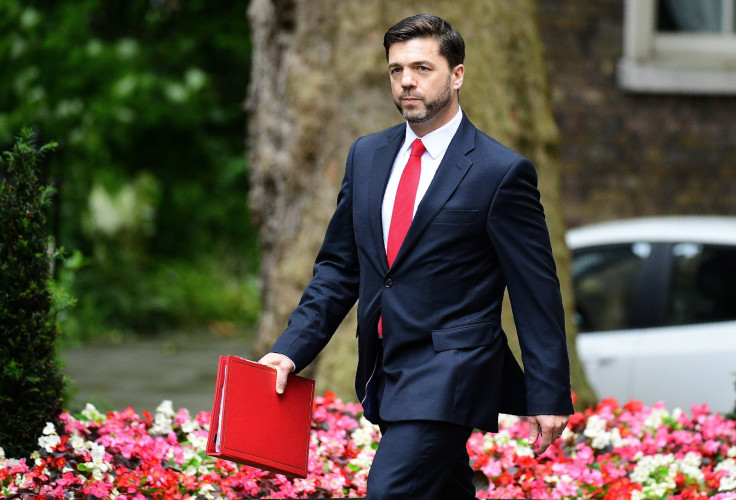
Gordon Brown, who seems to have given more commanding and inspiring speeches since he left 10 Downing Street that he ever did as prime minister, is scheduled to give another one later at the Institute for Public Policy Research.
The 'Future of Britain in Europe' event in Edinburgh will be the first time Brown has spoken publicly about the Brexit vote since it happened, although he has written a piece for the Guardian's Comment is Free section.
Brown writes:
Clearly Britain cries out for someone – or something – to heal the wounds inflicted during this campaign. This is not a question that is academic, or can wait. The Scottish government's rush to break-away raises an existential question, and already the United Kingdom looks united in name only. If Lord North went down in history for losing one union – with America – David Cameron could go down in history for losing two unions – with Europe and Scotland.
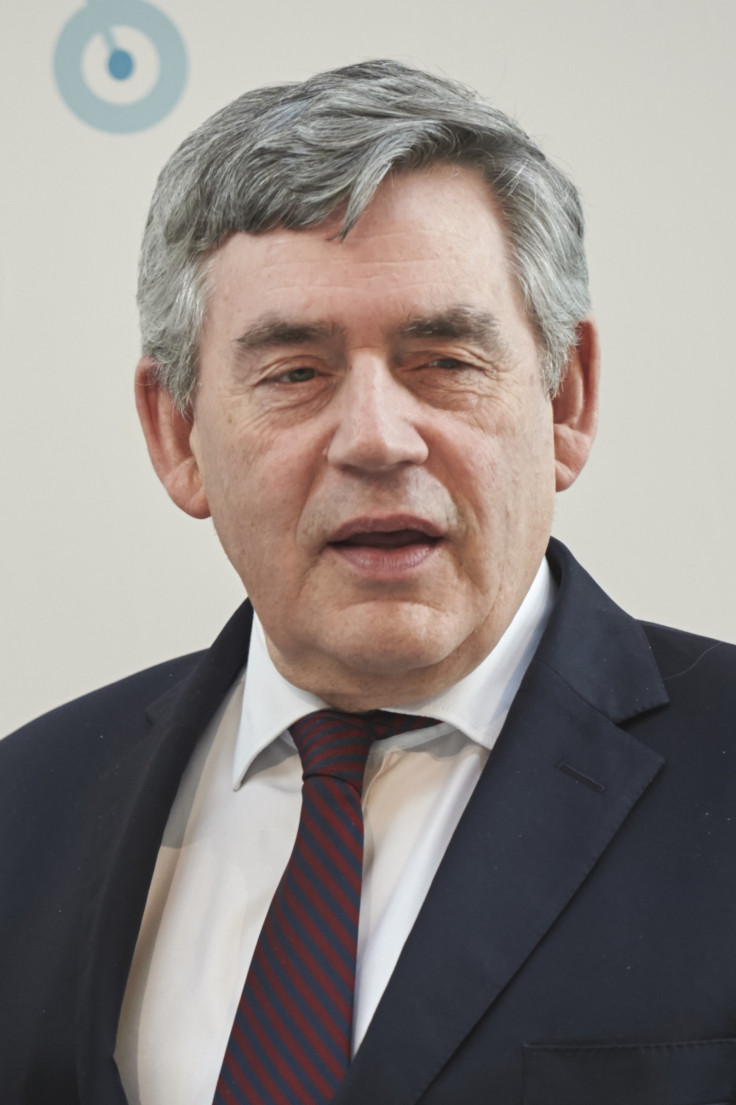
Nicola Sturgeon is also set to hold talks with European Parliament president Martin Schulz and president of the European Commission Jean-Claude Juncker in Brussels as part of her bid to keep Scotland in the EU.
Juncker previously said he believed it was not the right time to meet Sturgeon for the crucial discussions, but has now appeared to have changed his mind.
The First Minister is also expected to meet with Guy Verhofstadt, the former Belgian prime minister and leader of the Liberal group at the European Parliament.
Speaking ahead of her trip to Brussels, Sturgeon said:
"My objective at this very early stage is firstly to raise awareness of the fact that Scotland voted differently in this referendum to the UK as a whole and that there is an aspiration and desire in Scotland, cross-party, to protect Scotland's relationship with the European Union and our place in the European Union.
"And secondly, to begin the process of mapping out and exploring what the options for Scotland might be.
"I'm very aware that this is a long process ahead of us, it's likely to be a difficult and challenging process, but I'm determined that we take every possible step to protect Scotland's interests at every stage of it."

German chancellor Angela Merkel has also dismissed suggestions that the EU Referendum decision made by the British people could be reversed.
Reuters reported Merkel saying when asked about the Brexit: "I want to say very clearly tonight [28 June] that I see no way to reverse this. We all need to look at the reality of the situation. It is not the hour for wishful thinking."
She had previously dismissed Boris Johnson's suggestions that Britain could have access to the European single market and also restrict immigration at the same time, insisting there will not be a "cherry picking exercise" with regards to the post-EU negotiations.
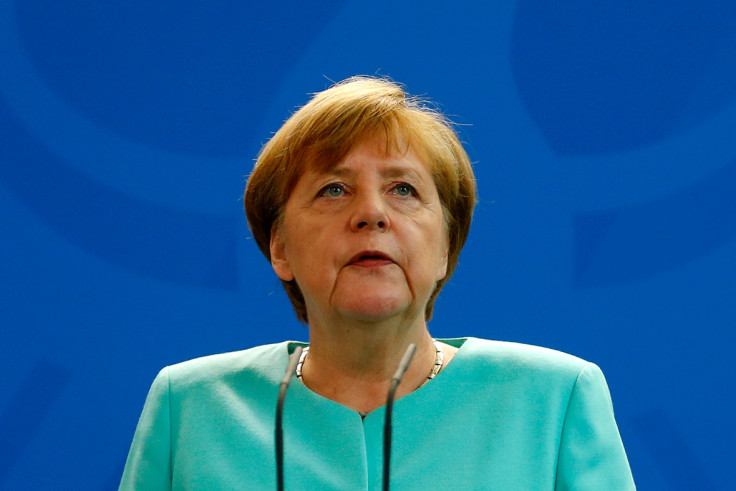
Good morning and welcome to the IB Times UK's live blog on the continuing post-Brexit fall-out for both the main political parties.
The main story from overnight is that Jeremy Corbyn is still refusing to stand down despite 172 of his own MPs backing a vote of no confidence againt him, compared to just 40 who still in support of him. Corbyn said he will still remain as leader as he does not want to "betray" those who elected him in the first place.
Angela Eagle and Tom Watson are two of frontrunners to challenge Corbyn for the leadership.
Full story here.

© Copyright IBTimes 2025. All rights reserved.




